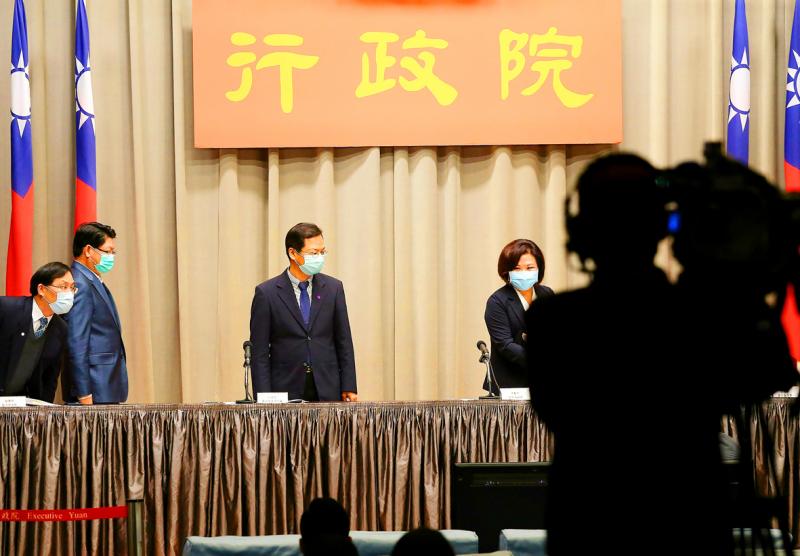The Ministry of Labor (MOL) yesterday detailed the latest government policies to ease unemployment amid the COVID-19 pandemic, including cash handouts of NT$30,000 (US$994.96) for self-employed people or freelancers.
To qualify for the cash handout, a worker must have participated in the Labor Insurance plan through a guild, Minister of Labor Hsu Ming-chun (許銘春) told a news conference at the Executive Yuan in Taipei.
To make sure that only those in need would receive the handouts, applicants must have been exempt from paying individual income taxes last year, and their insured monthly salary under the Labor Insurance system must not exceed NT$24,000, she said.

Photo: CNA
The handout would be wired into the bank account of successful applicants in a lump sum, she said.
People who are already receiving a government-issued subsidy due to the pandemic would not be eligible for the labor ministry’s subsidy, she said.
For example, tour guides who are receiving a monthly subsidy of NT$10,000 from the Ministry of Transportation and Communications would not qualify even if they are freelancers, she said.
The labor ministry’s statistics showed that about 1.33 million people would be eligible for the cash handout, she said.
The labor ministry is also planning to offer subsidized loans of up to NT$100,000 per person whose livelihood has been affected by the pandemic, with the interest rate capped at 1.845 percent, Hsu said.
The loan repayment period would be set at three years, with the ministry covering the interest payment for the first year and the borrower paying annual interest of no more than NT$1,845 in the second and third year, she said, adding that the ministry expects about 500,000 applicants.
The labor ministry would start accepting applications for the loans and the cash handouts within two weeks of the Legislative Yuan approving a proposed increase of NT$150 billion in the special budget for bailing out industries and workers hardest hit by the pandemic, she said.
In light of the increasing number of workers on unpaid leave, the ministry has put forward a plan to allow furloughed people to take part-time jobs at local governments, which is set to take effect in about a week, she said.
Participants would be allowed to work up to 80 hours per month at a designated local government agency and be paid the minimum hourly wage of NT$158, she said.
The project would last three to six months and is expected to benefit about 60,000 workers, she said.
The labor ministry has drawn up a similar plan for people laid off as a result of the pandemic, which would be initiated if the unemployment rate rises sharply, she added.
It has earmarked NT$6 billion for subsidies to about 60,000 university graduates whose job prospects might have been affected by the pandemic, but the specifics of the policy are still being ironed out, she said.

Taiwan has received more than US$70 million in royalties as of the end of last year from developing the F-16V jet as countries worldwide purchase or upgrade to this popular model, government and military officials said on Saturday. Taiwan funded the development of the F-16V jet and ended up the sole investor as other countries withdrew from the program. Now the F-16V is increasingly popular and countries must pay Taiwan a percentage in royalties when they purchase new F-16V aircraft or upgrade older F-16 models. The next five years are expected to be the peak for these royalties, with Taiwan potentially earning

STAY IN YOUR LANE: As the US and Israel attack Iran, the ministry has warned China not to overstep by including Taiwanese citizens in its evacuation orders The Ministry of Foreign Affairs (MOFA) yesterday rebuked a statement by China’s embassy in Israel that it would evacuate Taiwanese holders of Chinese travel documents from Israel amid the latter’s escalating conflict with Iran. Tensions have risen across the Middle East in the wake of US and Israeli airstrikes on Iran beginning Saturday. China subsequently issued an evacuation notice for its citizens. In a news release, the Chinese embassy in Israel said holders of “Taiwan compatriot permits (台胞證)” issued to Taiwanese nationals by Chinese authorities for travel to China — could register for evacuation to Egypt. In Taipei, the ministry yesterday said Taiwan

‘LIKE-MINDED PARTNER’: Tako van Popta said it would be inappropriate to delay signing the deal with Taiwan because of China, adding he would promote the issue Canadian senators have stressed Taiwan’s importance for international trade and expressed enthusiasm for ensuring the Taiwan-Canada trade cooperation framework agreement is implemented this year. Representative to Canada Harry Tseng (曾厚仁) in an interview with the Central News Agency (CNA) said he was increasingly uneasy about Ottawa’s delays in signing the agreement, especially as Ottawa has warmed toward Beijing. There are “no negotiations left. Not only [is it] initialed, we have three versions of the text ready: English, French and Mandarin,” Tseng said. “That tells you how close we are to the final signature.” Tseng said that he hoped Canadian Prime Minister Mark Carney

POSITIVE DEVELOPMENT: Japan and the US are expected to hold in-depth discussions on Taiwan-related issues during the meeting next month, Japanese sources said The holding of a Japan-US leaders’ meeting ahead of US President Donald Trump’s visit to China is positive news for Taiwan, former Japan-Taiwan Exchange Association representative Hiroyasu Izumi said yesterday. After the Liberal Democratic Party’s landslide victory in Japan’s House of Representatives election, Japanese Prime Minister Sanae Takaichi is scheduled to visit the US next month, where she is to meet with Trump ahead of the US president’s planned visit to China from March 31 to April 2 for a meeting with Chinese President Xi Jinping (習近平). Japan and the US are expected to hold in-depth discussions on Taiwan-related issues during the